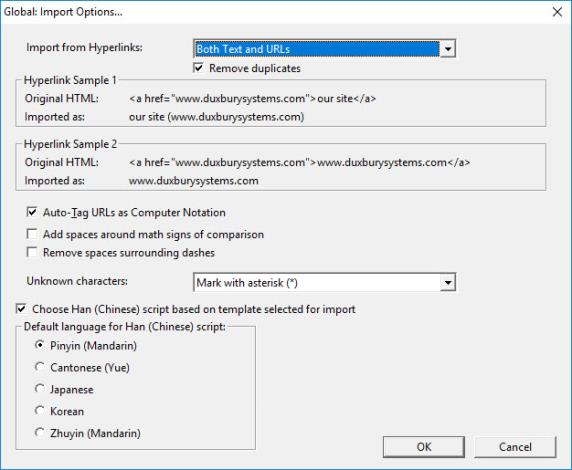Global: Import Options
Keystroke: o from Global menu.

The Import from Hyperlinks list box, shown here, gives you three options: URLs Only, Text Only and Both Text and URLs.

This is best explained with an actual example of text such as the following:
To go to our web site click here.
The reader can see underlined text representing a Hyperlink. Here is how DBT would import using the options above.
To go to our web site http://www.duxburysystems.com.
To go to our web site click here.
To go to our web site click here (http://www.duxburysystems.com).
In the event that both thetext and URL are identical, checking the "Remove duplicates" check box eliminates the duplicate text.
Auto-Tag URLS as Computer Notation: Whether to mark URLs as "Computer Braille" depends on the braille code currently in use.
Add spaces around math signs of comparison: a UEB rule allows spaces to be added around signs of comparison (such as = equals) for new braille learners.
Remove spaces surrounding dashes: There are cases where the local rules require there to be no spaces around dashes.
Unknown characters: With many thousands of Unicode characters now available it is sometimes the case that these have no braille definition as yet. This list-box allows you to either (a) mark them with an asterisk, (b) ignore them, or (c) output their Unicode Value.

If you wish to investigate what the unknown character is, we suggest you select the Unicode option, import your file, and make a note of the value displayed. This option allows you to look up the character in the Unicode tables.
For a more detailed explanation about Unicode please click here.
Choose Han (Chinese) script based on template selected for import: From DBT 12.1 SR2 there is a new checkbox in this dialog. Most users who work with Han languages will want to leave the new option checked. It allows the user to skip revisiting the dialog to set a specific Han script treatment for importing documents containing Korean, Japanese, or Chinese ideograms.
Default language for Han (Chinese)script: When using Chinese (Han) scripts, select one of the five radio buttons, Mandarin, Cantonese (Yue), Japanese, Korean, or Zhuyin (Mandarin) to force a language interpretation regardless of the DBT template selected for import.